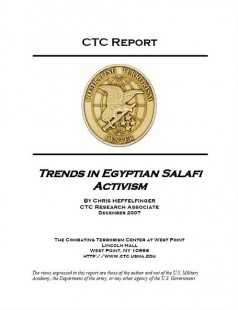This report will explore the status of radical Islamic ideology and its popularity among Egyptians in Cairo today. It stems in part from an October 2007 research trip to gain insights into Salafi-jihadi activism and the political, social, and religious climate that either supports or inhibits its growth. That climate in Cairo—gauged by recent public opinion polls, my interviews and observations, and trends among Salafis in Egypt today—does not seem to bode favorably for militant Islamist activism. The city is not a center for this ideology or its movement, partly due to recent economic success, belief in democratic principles, and Egyptian Muslims’ rejection of violent tactics.
The tension between Cairo’s Islamist past and sense of progress and prosperity creates a duality in Egypt’s capital that, for the time being, is a positive sign for efforts to combat terrorism. For Egyptians, there is a co-existence of Islam and Egyptian nationalism, which is open to the West and often associated with democratic values. The relationship between Egyptian nationalism and Islam also serves, in this sense, as a deterrent to the popularity of jihadists. The jihadi movement depends on the influence of ideologues who legitimize the movement to the Muslim public and instill the belief that violent opposition to the existing government, or secular rule generally, is a priority for the Muslim community. These ideologues—and the jihadi movement—are weakened when Muslims view Islam and their own nationalism as being complementary rather than at odds.
Based on recent patterns, Egyptian Muslims may well favor democracy and development over pan-Islamic resistance and the call to global or local jihad. If Egypt can be a model for Islam and modernity that moves toward gradual democratization, it could substantially weaken the credibility of al-Qa’ida. At present, it appears that among most Egyptian Muslims, trends toward jihad are waning.
 Skip to content
Skip to content

